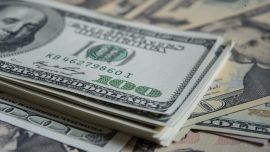President Mauricio Macri, the leader of Argentina’s centre-right coalition, is on a roll.
The Juntos por el Cambio leader has embarked on a whirlwind tour of the nation ahead of the first round presidential election on October 27. The only unusual thing about Macri’s trailblazing is that he was defeated in the August PASO primaries by Alberto Fernández, the hopeful who heads a united Peronist front. Surf Argentina’s newspapers and you will bump into public opinion polls that say Macri will be thrashed once again. Many observers even consider Macri’s campaigning to be pointless. But then again, what is a candidate to do? By prancing about on stage, waving to the crowd and even celebrating the birthday of an elderly woman in Tucumán by pretending to kiss her feet, the president is trying to convince voters that they should “rethink” their decision. While he’s at it, the president would also like you to forget about the economy: rocketing inflation, two-digit unemployment, rising poverty and hefty utility rates.
The only problem is that September’s inflation rate is scheduled to be announced next week with the election looming. It will be no lower than five percent. A punishing monthly rate, which the government now puts down to the political volatility, is not even the only economic problem really. The backlash to Macri’s antics on the trail could be an even bigger defeat on October 27. The turnout was impressive at the president’s recent rally in Tucumán. But it had not been that good when his bandwagon made stops in two cities in Buenos Aires Province, Bahía Blanca and Junín.
Still there is no denying that Macri will not go out with a whimper, rather by whipping up one hell of a fuss. The president’s agitation includes telling the crowds now that he is against abortion. It was Macri who allowed a abortion bill to be sent to Congress where it was ultimately defeated. The president, during the heated debate at that time, had been a little sketchy about his stance. But now he is telling the nation that he opposes the legalisation of abortion. You guessed it: Macri is looking to win the hearts of the anti-abortion voters (polls show that there are many of them in Tucumán, for instance). If Macri is routed once more on October 27 his last efforts will look ridiculous. But the president’s strategists must think that at least they are closing ranks and that a bigger turnout on election day could offer them the chance of an upset. Yet all this is coming from a camp that predicted an annual inflation rate of 10 percent for 2018 and wanted you to believe it. Alberto Fernández’s response to Macri’s Oktoberfest seems to be deadpan, a campaign devoid of massive demonstrations. The candidate has the look of a greying company manager who has had enough of nonsense. A Peronist, Fernández has even kept his old-school moustache when other prominent local politicians, most notoriously Macri, chose to shave it off.
Fernández is now the leader (or at least its frontrunning candidate) of an ample centre-left coalition, one which includes former president Cristina Fernández de Kirchner as his running-mate. Macri would like you to forget about economic woes and have the campaign play out like a series that you stream late at night. The Peronists are doing the opposite. Pending are two presidential debates where the opposition candidates are unlikely to let Macri off the economic hook. For the president, the debates are also the last chance to improve his standing.
This week, heading his own mini-gathering – which included priests, business leaders, trade unionists and human rights activists – Fernández announced a plan to fight hunger. Attending was Juan Grabois, a fiery Catholic activist who recently came out in favour of land reform. Grabois came under fire for endorsing radical policies and had been rarely seen in public with Fernández. Yet it’s now clear that the Peronist candidate really does want an ample coalition, which includes the controversial figure. The Peronist front, formally called Frente de Todos (“Front for All”), is now preaching regulation. The prices of the basic food basket, he said, must be “reprofiled” to make them affordable – an ironic play on words for the term the government has chosen to describe its debt restructuring plan.
Front-runners, however, can still slip up. Axel Kicillof, the winning Peronist gubernatorial candidate in Buenos Aires Province, faced a barrage of criticism this week from ruling coalition officials when he said live on television that rising unemployment was forcing some families into petty drugtrafficking. The former economy minister said he was only relaying what slum priests were telling him, but the ruling coalition saw this as an opportunity to throw some punches at a candidate who is clearly in the lead in the country’s mostpopulated distrcit, currently ruled by the Macri-aligned María Eugenia Vidal. The governor, lest we forget, was supposed to be the most popular politician in the land. But then the August 11 primary happened and she badly lost to Kicillof, who served for two years under Fernández de Kirchner, before she left office in 2015.
Kicillof’s comments gave the national government the opportunity to drive home the message it is tough on crime and that it will fight drug-trafficking to the end. Macri, who on stage at the rallies now looks like one of those New Zealand rugby players doing the Maori haka dance, is trying to invigorate his voters and generate some momentum. Even Alberto Fernández has cautiously declared that he has not won just yet.
The ruling coalition plans one last big rally in the heart of Buenos Aires City ahead of the election, but not everyone is unified. The backdrop to this chest-thumping is that Macri’s coalition appears to be quietly disintegrating backstage in a haze of cloak and dagger intrigue. Elisa Carrió, a key proMacri lawmaker, has openly accused the president’s affable Interior Minister Rogelio Frigerio, who has a Peronist background, of granting favours to the opposition governors backing Alberto Fernández.
All presidential campaigns are fantasies made of sugar candy, spun by candidates in the face of voters to entice them. Argentina’s race is no different. Macri needs you to believe that he can still force a run-off. What is different here is that the Central Bank continues to be drained of dollars and there is a huge debt waiting to be “reprofiled” in the middle of an economic depression. The shift in the political landscape could be dramatic on election night. Macri faces redemption or ridicule. The president should brace for the shock.





















Comments